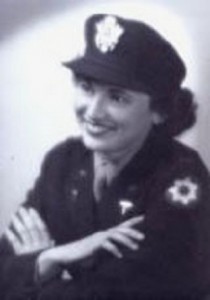In the dead of winter with snow and sub-zero temperatures at times, U.S. soldiers, with the help of allied forces, fought brutally during World War II against Hitler’s army at the Battle of the Bulge between Dec. 6, 1944 and Jan. 28, 1945.

Not far from the frontlines, Dorothy Steinbis-Davis, RN, served the wounded—many of whom suffered from frostbite and other cold-related injuries—and saw many more casualties as they were brought to her small detachment, part of the 57th Field Hospital.
Working in the mobile unit, made up of four physicians, a dentist, a medical administrative officer, five nurses, several enlistees and a small surgical team, proved to be a demanding and exhausting task for Davis.
“Our patients were those who were critically wounded and needed extensive nursing care,” said Davis, a 2nd lieutenant with the U.S. Army Medical Corps. “The mortality rate was high—at times, over 20 percent. This was emotionally difficult. A patient you had over the past 12 to 15 hours, and whom you thought would survive, may have died when you returned to work after a few hours of sleep.”
With gun fire ringing out just a short distance away, Davis shared that there were many times when she and her crew didn’t know if they were going to be able to evacuate before the area was overrun by Germans.
“Transportation in these situations was always a grave problem,” she said.
She added, “You are afraid but on the other hand, you really had to stay focused on what you were doing.”
Though Davis’ detachment wasn’t officially assigned to the Battle of the Bulge, they were on the “French rim,” just close enough to treat any wounded in the area. At one point, the small detachment supported 24 battalions of troops, including a number of civilians who required emergency medical care before they could be transported to civilian hospitals.
“I can distinctly remember crawling into my bedroll after one exhausting day and thinking, ‘My God, what if we should lose the war?’”
During the Battle of the Bulge, Davis recalled how the hospitals often suffered from mass confusion particularly with the continuous need for blood and not knowing the state of the combat situation. Between October 1944, when Davis’ detachment first joined the Theater of Operations, and April 1945, the hospital moved 40 times.
Davis explained that many of the moves took place at night in blackout conditions so that the roads would be available during the day for use by the tanks, infantry and the Red Ball Express, a fleet of over 6,000 trucks and trailers that delivered over 400,000 tons of ammunition, food, and fuel to the Allied armies.
When possible, a schoolhouse or large building was selected for a makeshift hospital. On several occasions, Davis said that her crew would move into a building still occupied by a German hospital.
Because most of the buildings were so war-ravaged, Davis said that oftentimes patients on litters would be waiting for medical service to arrive. Nurses and doctors would immediately have to begin preparing the patients for surgery while the enlistees set to work cleaning the area, setting up a generator for electricity and assembling an X-ray unit, operating room and post-op ward.
By mid-March, as the war was nearing the end, the entire 57th Field Hospital was assigned to Toul, France, to care for 355 Allied national patients, most of whom were Russian, as well as Yugoslavian, Serbian and Polish nationals, who had been liberated from the Germans.
The prisoners, who had been forced by the Germans to work in the lime mines near Metz, France, suffered from tuberculosis, osteomyelitis (infection of the bone caused by the seeding of the bacteria within the bone from a remote source), mine injuries and various nutritional diseases.
“[The prisoners’] state had been reduced to one of animals in their struggle for existence,” said Davis, who helped improve their health status so they could withstand their return trip to Russia.
Davis said the devastation and destruction around her could scarcely be imagined—roads littered for miles with debris and cities destroyed to almost non-existence. But her job in Europe was not over yet.
When her unit reached Germany, they worked at several air strips to serve as air holding hospitals before the wounded were air evacuated back to the United States once physically able. Some days, Davis and her crew saw up to 1,000 patients come through.
For three or four hours before a flight, the medical staff would feed, medicate and change the patients’ bandages.
“Many of them had never been on an airplane before so we really tried to make them feel comfortable and tried to control their worries,” said Davis. She learned many years later that the planes, used to bring food, gasoline and equipment to Europe, were soaked in gasoline. Not a good mix when there were several oxygen tanks set up for patients to withstand the long flight home.
After the war, Davis married a member of the 57th Field Hospital, Col. William V. Davis, an Adjutant from Illinois who had served in the U.S. Army since 1938 and who survived the bombing at Pearl Harbor.
Though Davis retired from the U.S. Army after serving two years, she continued to use her nursing skills volunteering with the American Red Cross, an organization she still dedicates her time to—as a registered nurse—60 years later. Over the years, she helped run school health programs, provided immunizations and eye checks, and has volunteered for numerous other activities.
Davis, who originally wanted to be an “airline stewardess”—a profession that required a nursing background—soon realized that nursing was her love. Several years before graduating from nursing school at the University of Minnesota, she not only signed up for the American Red Cross when representatives came to her hospital to recruit nurses, but she also enlisted in the U.S. Army, which would recruit her as soon as she graduated, passed her boards and turned age 21.
“I fell in love with nursing and then when the war came along there was no thought of becoming an airline stewardess,” said Davis. “The Nurse Corps changed my whole life.”
